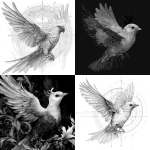Explore the Best AI Image Gallery

Quantum Leaps: How Quantum Computing is Reshaping the Creative Industry
The world of creativity is on the cusp of a profound transformation, driven by the emergence of quantum computing. This revolutionary technology, harnessing the principles of quantum mechanics, promises to unlock unprecedented computational power, blurring the lines between imagination and reality in the creative industry.
Quantum Creativity: Breaking Boundaries
Imagine generating stunningly realistic 3D models with unparalleled detail, crafting interactive narratives that adapt to user choices in real-time, or composing music with an entirely new dimension of complexity. These are just a few examples of how quantum computing is poised to reshape the creative landscape.
- Generative Design: Quantum algorithms can analyze vast datasets and generate innovative designs for architecture, product development, fashion, and more. This opens doors to truly unique and personalized creations, driven by data-informed insights.
- Interactive Storytelling: Imagine immersive narratives that evolve based on your choices, creating a deeply personal and engaging experience. Quantum computing can power this next generation of storytelling, blurring the lines between fiction and reality.
- Artistic Expression: Artists can leverage quantum simulations to explore new visual paradigms, manipulate sound waves in unconventional ways, or even create art that responds to human emotions in real-time. The possibilities are truly limitless.
Beyond Artistic Frontiers
The impact of quantum computing extends far beyond the realm of fine arts.
- Film and Animation: Quantum algorithms can accelerate rendering processes, enabling filmmakers to create stunningly realistic visual effects with greater detail and complexity.
- Gaming: Imagine virtual worlds that are truly dynamic and responsive, where characters behave with unprecedented realism and storylines adapt to player actions in real-time. This is the potential of quantum computing for gaming.
- Advertising and Marketing: Quantum-powered personalization can revolutionize advertising, tailoring messages and experiences to individual consumers based on their preferences, behaviors, and even emotions.
Navigating Ethical Considerations
As with any powerful technology, the rise of quantum computing presents ethical challenges that must be addressed.
- Bias and Fairness: Quantum algorithms are trained on data, and if that data reflects existing societal biases, the resulting creative outputs may perpetuate those inequalities.
- Ownership and Copyright: Who owns the copyright to creations generated by quantum algorithms? This is a complex legal question that requires careful consideration as the technology evolves.
- Accessibility and Equity:
Quantum computing requires significant resources and expertise. Its crucial to ensure that its benefits are accessible to all, regardless of their socioeconomic background or location.
The Quantum Future of Creativity
While still in its early stages, quantum computing is rapidly progressing.
- Increased Accessibility:
- Cross-Disciplinary Collaboration:
- **New Creative Paradigms:
As hardware and software become more affordable and user-friendly, quantum computing will gradually become accessible to a wider range of creators.
The convergence of quantum computing with fields such as artificial intelligence, neuroscience, and materials science will lead to groundbreaking innovations in the creative domain.
Quantum computing will continue to push the boundaries of what is possible, inspiring entirely new forms of artistic expression and interactive experiences.
The quantum revolution promises to be a transformative era for the creative industry, unlocking unprecedented possibilities for innovation, collaboration, and artistic exploration.









](https://images.ai-img.art/thumbnails/150/5f48fc91b83cfbe17932638af412d0c3a1649ed43692e334aa8cfb9b653153d0.webp)




](https://images.ai-img.art/thumbnails/150/3478bd7a5bba66ae70209eef4f2b09837ef09ca033a7511ea86692824661b0a8.webp)








](https://images.ai-img.art/thumbnails/150/815d563985dccec04e21f9a9fa89f09cadc6693be7c6d8ab87defff2b61d417e.webp)







](https://images.ai-img.art/thumbnails/150/6917eea85c775b7876cfba66dfdcae79d6f026ca442f0dfa77824f5af58cfbb0.webp)





](https://images.ai-img.art/thumbnails/150/bc924c2b4ba958c2aabf177b116f47053317904ae6e56b84db3f7dc2d666c080.webp)




](https://images.ai-img.art/thumbnails/150/a2e728c4e462bef482c106719df04081c360d4444d4d154c22318725b7bcb124.webp)


](https://images.ai-img.art/thumbnails/150/4a7a4d6bca6b537f112483b9db13c7dfe541bb35fd8a022bdd131714cc60622a.webp)


](https://images.ai-img.art/thumbnails/150/024a13ae047c60649b5e7b4f5a71cb7e8a0e8838266fedbd1cb342ac1d2e951c.webp)
